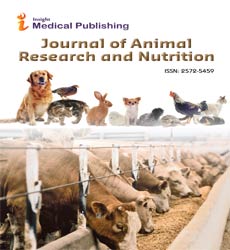Abstract
Effects of Dichrostachys glomerata Feeding Regimes on Growth Performance, Gut Microbiota and Haemato-Biochemical Profile of Japanese Quails
Background: The ban of antibiotics growth promoters due to bacteria resistance and the presence of chemical residues in animal products have stimulated research for alternative feeding supplements in poultry production. This study was designed to assess the production performance of quails under two D. glomerata feeding regimes.
Methods: A total of 160 two weeks old Japanese quail chicks were assigned to four experimental treatments in a completely randomised design with 4 replicates of 10 chicks (5 males and 5 females) in each treatment. The two feeding regimes consisted of 5 g/kg of feed (T1) and cold water inclusion of 5 g/l (T2) of D. glomerata. Data were recorded on feed intake, weight gain, feed conversion ratio, haematological and serum biochemical parameters, and intestinal microbial count.
Findings: Quails fed on the two feeding regimes were compared to quails fed with diet without any supplement (T0) and an antibiotic (1 g/kg) medicated diet. The results showed no significant difference (p>0.05) in feed intake and weight gain, however the feed conversion ratio was significantly lower (p<0.05) with antibiotic compared to the two feeding regimes. The feeding regimes did not have any significant (p>0.05) effect on carcass yield and relative weight of organs. Triglycerides concentration was significantly higher in quails fed on cold water administration of D. glomerata as compared to the control diet. Aspartate aminotransferase (ASAT), alanine aminotransferase (ALAT), creatinine, total protein, albumin, urea, total cholesterol, HDL-cholesterol and LDL-cholesterol were not significantly affected by the feeding regimes. Except for the concentration of pack cell volume (PCV) that was significantly high (p<0.05) with cold water administration (41.5%) as compared to the negative control ration (35.25%), haematological blood components were not significantly affected by the feeding regimes. Feeding quails with D. glomerata powder whatever the regime significantly (p<0.05) increased lactic bacteria count compared to E. coli, Salmonella and Staphylococci.
Conclusions: The feeding of D. glomerata powder to quails through feed or drinking water can be used as an alternative to antibiotics to balance gut microbiota in Japanese quails.
Author(s):
Ebile Dayan A, Kana JR, Pimagha Moffo HJ, Edie Nounamo LW, Nguefack Djieufo G, Ngouana Tadjong R, Fonteh AF
Abstract | Full-Text | PDF
Share this

Google scholar citation report
Citations : 764
Journal of Animal Research and Nutrition received 764 citations as per google scholar report
Abstracted/Indexed in
- Google Scholar
- China National Knowledge Infrastructure (CNKI)
- WorldCat
- International Committee of Medical Journal Editors (ICMJE)
- Secret Search Engine Labs
Open Access Journals
- Aquaculture & Veterinary Science
- Chemistry & Chemical Sciences
- Clinical Sciences
- Engineering
- General Science
- Genetics & Molecular Biology
- Health Care & Nursing
- Immunology & Microbiology
- Materials Science
- Mathematics & Physics
- Medical Sciences
- Neurology & Psychiatry
- Oncology & Cancer Science
- Pharmaceutical Sciences

